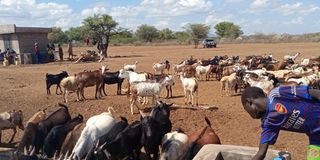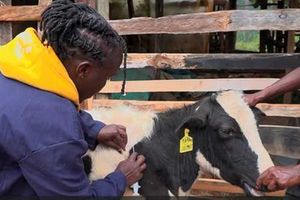Climate change-induced livestock diseases fuel tension along Kenya-Uganda border

Goats and sheep quenching their thirst at a watering point in Nakodapus village in Turkana near the border of Kenya and Uganda on October 19, 2024. Most herders fled from tse tse fly infested-Nawountos village to save their livestock from African animal trypanosomiasis.
What you need to know:
- Transboundary animal diseases are highly contagious and transmissible epidemic diseases of livestock, which have the capability for rapid spread to new areas and regions regardless of national borders and have serious socio-economic and public health consequences.
The Kenya-Uganda border has since 1973, when Turkana and Matheniko pastoral communities buried weapons of war at Lokiriama village, largely witnessed relative peace; resulting in cross-border trading activities.
The scarcity of pasture and water as a result of prolonged drought, especially in Turkana, has been forcing pastoralists from Loima, Lokiriama and Turkana West sub-counties to cross over to the Karamoja region of Uganda for relief.
The situation has, however, been resulting in conflicts; with armed bandits taking advantage of the desperate situation to attack herders.
Mr Korobe Ngasike, a herder from Nawountos village, said that while coordinated security operations at the border and peace-building activities have helped to tackle banditry, the herders are now threatened by deadly trans-boundary diseases resulting from the effects of climate change.
Transboundary animal diseases are highly contagious and transmissible epidemic diseases of livestock, which have the capability for rapid spread to new areas and regions regardless of national borders and have serious socio-economic and public health consequences.
"Our search for pasture forces some of us to settle at border areas with a high burden of cattle vector-borne diseases and Peste des Petits Ruminants, a notifiable and serious viral disease of small ruminants such as goats and sheep, and areas near Kidepo National Park that have African animal trypanosomiasis," Mr Ngasike said.
He said disease outbreaks vary with changing weather conditions.
"We initially used to engage in counter raids to restock once livestock were stolen but at the moment there are fears of raiding to restock due to diseases," Mr Ngasike said.
Part of the 11 resolutions that the communities agreed on during the commemoration of the 51st Lokiriama Peace Accord was joint interventions in animal and human health.
Mr Joseph Areng, Peace Building Officer at the Agency for Cross Border Pastoralists Development, said joint mass livestock treatment and vaccination will not only ensure sustainable pastoralism, but also promote coexistence.
"We have proposed joint interventions in animal and human health programmes and the development of policies to guide equitable resource sharing. Recognising the challenges of climate change and rapid urbanisation, the communities should also diversify livelihoods," Mr Areng said.
Mr Charles Ekai, a herder from Oropoi village, said their livestock die often due to tsetse flies infestation.
"When there are no interventions from authorities, he is forced to drive his surviving livestock to Natira village, which sometimes die due to lack of pasture," Mr Ekai said.
"We lose our livestock to trypanosomiasis disease caused by tsetse flies. Poor road and communication network is usually our major challenge when seeking aid from vet officers and therefore most of us watch helplessly as livestock die.”
Turkana Governor Jeremiah Lomorukai and head of Uganda delegation Peter Lokeris, who is also the minister for Karamoja Affairs, emphasised mutual cooperation to address emerging challenges at the border.
Mr Lomorukai said that with peace and unity, they will easily coordinate and address the challenges facing border residents and create a conducive environment for development.
"My administration is committed to increased collaboration with neighbouring governments and deeper community engagements for sustainable development at the borderlands," he said.
The governor called for swift conclusion to the revised Memorandum of Understanding and Resource Sharing Agreements between Kenya and Uganda, describing these documents as transformative tools essential for the socio-economic advancement of the region.
“The Resource Sharing Agreement is more than just a document; it is a beacon of hope for socio-economic growth and stability across our border,” he said, highlighting its potential to address long-standing challenges in the region.
He warned that any form of conflict could undermine the well-being of these communities and hinder the exploration and utilisation of local resources despite their shared heritage and common ancestry.
The governor assured the Ugandan delegation of Turkana leadership’s unwavering commitment to the peace process, urging political leaders from the region to actively advocate for open interaction and integration among residents of the two nations to reinforce the bonds that connect them.
Dr Lokeris said sustained peace is critical for the development of the region.
"Let's bank on the peace pact as a testament to the power of unity and cooperation in overcoming emerging challenges like diseases," he said.





